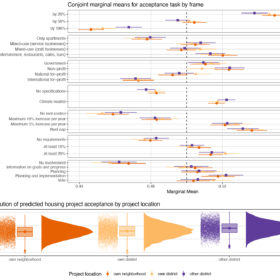
Michael Wicki, Katrin Hofer, David Kaufmann
2022
Full text
Dense and compact cities yield several benefits for both the population and the environment, including the containment of urban sprawl, reduced carbon emissions, and increased housing supply.
Densification of the built environment is thus a key contemporary urban planning paradigm worldwide. However, local residents often oppose urban densification, motivating a need to understand their underlying concerns. In order to do so, we examined different factors driving public acceptance of housing densification projects through a combination of a conjoint survey experiment and different proximity frames among 12,402 participants across Berlin, Chicago, London, Los Angeles, New York, and Paris. Respondents compared housing densification projects with varying attributes, including their geographic proximity, project-related factors, and accompanying planning instruments. The results indicate that the acceptance of such projects decreases with project proximity and that project-related factors, such as the type of investor, usage, and climate goals, impact densification project acceptance. More specifically, we see a negative effect on acceptance levels for projects with for-profit investors and a positive effect when the suggested developments are mixed use or climate neutral. In addition, planning instruments, such as rent control, inclusionary zoning, and participatory planning, appear to positively influence acceptance. Interestingly, a cross-continental comparison shows overall higher acceptance levels of densification by US respondents. These multifaceted results allow us to better understand what drives people’s acceptance of housing projects and how projects and planning processes can be designed to increase democratic acceptance of urban densification.
Proceedings of the National Academy of Sciences (PNAS), 119(38), e2201780119.
